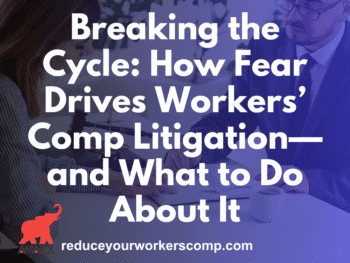
In order to address the changing dynamics and increased cynicism within the systems, states are seeking creative solutions to inform parties of their rights without being an advocate. One such method of accomplishing this goal is the creation of an ombudsman program to make sure parties are aware of their rights and avoid needless litigation.
What is an Ombudsman?
The term ombudsman has its origins in accident Rome, where a government official would monitor elected officials. Their role was to ensure the government was not taking advantage of their position. In essence, it was an undercover inspector of the government. This same form of oversight took hold in indigenous Scandinavian culture under the term “ombudsman,” with an entomology derived from Old Norse. Translated literally it means a “proxy representative.”
Click Link to Access Free PDF Download
“How To Avoid, Manage, And Win Workers’ Comp Claim Litigation”
Role of an Ombudsman in Work Comp
With the increasing demands of workers’ compensation disputes, many states have developed the position of an ombudsman to oversee and assist all interested parties in the workers’ compensation system. This ensures the rights of the injured worker are being considered in the process, but not being an advocate for either side.
Ombudsman: Watchperson and Neutral
Jurisdictions with an ombudsman program often locate this office inside their industrial commission or labor department. Although the position is located within an agency that ultimately decides workers’ compensation disputes, the role serves a distinct capacity of not taking sides. The focus is always to improve the process for all, at the expense of nobody.
Ombudsmen assist injured workers in the following ways:
- Develop and provide clear and concise information regarding an employee’s rights within the workers’ compensation system;
- Assist unrepresented employees if they have problems in contacting a claim handler. They can also direct the employee to the correct representatives inside an employer when dealing with self-insured employers; and
- Serve as a resource for additional human services an employee might need. This can include information on assistance with finding housing and medical care during disputes over primary liability and the reasonableness/necessity of medical treatment.
An ombudsman can also assist employers and small business in the workers’ compensation process. Help on these issues can include:
- Provide information on correct workers’ compensation processes and timelines. This includes how to correctly complete a First Report of Injury following a workplace incident;
- Matters concerning workers’ compensation insurance coverage, or even issues concerning coverage disputes; and
- Notifying employers of their rights within the workers’ compensation process.
An ombudsman should never be an advocate for a party in the workers’ compensation process. This includes never providing legal advice to an employee, employer or insurer/self-insured employer. While the role is somewhat limited, proactive stakeholders can publicize the role of an ombudsman and use one as a resource to educate all involved in the process.
Conclusions
Ombudsmen play a defined, but important role in many workers’ compensation resources. While they are mainly used for educational purposes, stakeholders concerned about costs in programs can use them to their advantage. This includes educating the labor force and working with one on troublesome issues to improve the system or processes.
Author Michael Stack, Principal, Amaxx LLC. He is an expert in workers compensation cost containment systems and helps employers reduce their work comp costs by 20% to 50%. He works as a consultant to large and mid-market clients, is co-author of Your Ultimate Guide To Mastering Workers Comp Costs, a comprehensive step-by-step manual of cost containment strategies based on hands-on field experience, and is founder & lead trainer of Amaxx Workers’ Comp Training Center. .
Contact: mstack@reduceyourworkerscomp.com.
Workers’ Comp Roundup Blog: https://blog.reduceyourworkerscomp.com/
©2017 Amaxx LLC. All rights reserved under International Copyright Law.
Do not use this information without independent verification. All state laws vary. You should consult with your insurance broker, attorney, or qualified professional.




























